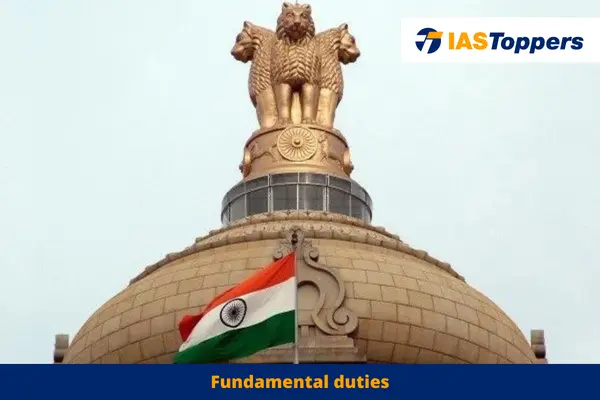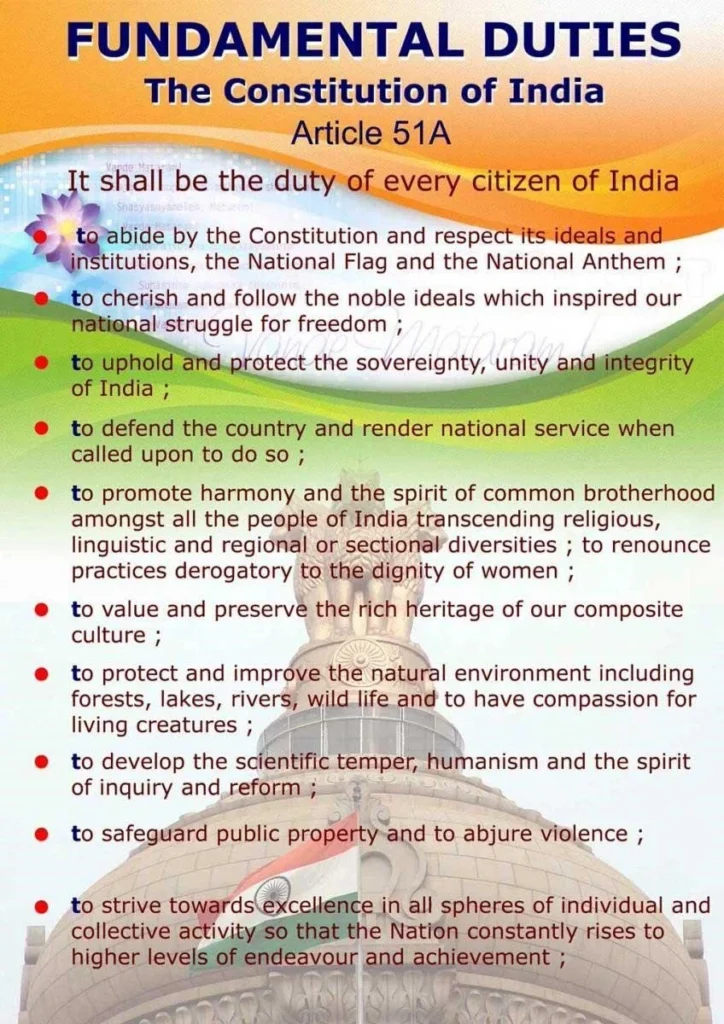The Fundamental Duties are moral obligations of all citizens to uphold the unity of India and to help promote a spirit of patriotism. These duties set out in Part IV–A of the Constitution of India, concern individuals and the nation. They are not enforceable by courts unless otherwise made enforceable by parliamentary law.
Fundamental Duties will be helpful for UPSC IAS Exam preparation. GS Paper-2 Indian Polity.
Table of Content
- Fundamental duties
- Fundamental Duties in India
- Key Facts Related to Fundamental Duties
- Swaran Singh Committee on Fundamental Duty
- Verma Committee on Fundamental Duties
- Importance of Fundamental Duties
- Criticism of Fundamental Duties
- Conclusion
- Frequently Asked Questions (FAQs)
Fundamental duties
- In 1976, the 42nd amendment to the Constitution was passed, which inserted a list of Fundamental Duties of Citizens.
- However, the Constitution does not say anything about enforcing these duties.
- The inclusion of fundamental duties has not changed the status of fundamental rights, and the Constitution does not make the enjoyment of rights dependent or conditional upon the fulfilment of duties.
Fundamental Duties of Indian Constitution
There are total 11 fundamental duties in India, which are mentioned below:
- Abide by the Constitution and respect its ideals and institutions, the National Flag and the National Anthem.
- Cherish and follow the noble ideals which inspired our national struggle for freedom.
- Uphold and protect the sovereignty, unity and integrity of India.
- Defend the country and render national service when called upon to do so.
- Promote harmony and the spirit of common brotherhood amongst all people of India transcending religious, linguistic and regional or sectional diversities and to renounce practices derogatory to the dignity of women.
- Value and preserve the rich heritage of our composite culture.
- Protect and improve the natural environment including forests, lakes, rivers and wildlife and to have compassion for living creatures.
- Develop the scientific temper, humanism and the spirit of inquiry and reform.
- Safeguard public property and to abjure violence.
- Strive towards excellence in all spheres of individual and collective activity, so that the nation constantly rises to higher levels of endeavour and achievement.
- The 86th Constitutional Amendment Act of 2002 added a new duty for parents or guardians to provide opportunities for education to their child or ward between the age of six and fourteen.
- This duty was added when Article 21A made the Right to Education a Fundamental Right, which guarantees free and compulsory education to all children between the ages of six and fourteen.
Key Facts Related to Fundamental Duties
- The idea of Fundamental Duties in the Indian Constitution was borrowed from the USSR Constitution, and the duties were enumerated in Part IV(A) of the Constitution in a single Article 51A.
- The Fundamental Duties, like the Directive Principles of State Policy, are non-justiciable, meaning that they cannot be enforced by the courts.
- The duties were added by the 42nd Constitutional Amendment Act of 1976, on the recommendations of the Swaran Singh committee, which had recommended only eight duties, but the amendment added ten duties.
- In addition, one more duty was added by the 86th Constitutional Amendment Act of 2002 – 51A(k) – bringing the total number of duties to eleven.
- The Japanese Constitution is one of the other democratic nations that have a provision dealing with the duties of its citizens.
- The Fundamental Duties in the Indian Constitution apply only to citizens and do not extend to foreigners.
Swaran Singh Committee on Fundamental Duty
- The Swaran Singh committee recommended that in addition to enjoying certain rights, citizens also have certain duties to perform, and this recommendation was accepted by the government.
- A new section, Part IVA, was added to the Constitution, and only one article, Article 51A, was inserted in it, which deals with Fundamental Duties.
- Some recommendations of the committee that were not accepted include:
- Parliament may provide for any penalty for failure to adhere to any Fundamental Duty,
- No law imposing such a penalty could be questioned in the court, and
- Duty to pay taxes should also be a Fundamental Duty of the citizens.
Verma Committee on Fundamental Duties
- Verma Committee was set up in 1999.
- The Verma Committee found legal provisions for the implementation of some of the Fundamental Duties:
- Prevention of Insults to National Honour Act 1971
- Protection of Civil Rights Act 1955
- Unlawful Activities (Prevention) Act 1967
- Representation of People Act 1951
- Wildlife (Protection) Act 1972
- Forest (Conservation) Act 1980
Importance of Fundamental Duties
- Fundamental Duties serve as a reminder to citizens that while enjoying their rights, they should also be conscious of the duties they owe to their country, society, and fellow citizens.
- They serve as a warning against antinational and antisocial activities like burning the national flag, destroying public property, and so on.
- Fundamental Duties serve as a source of inspiration for citizens and promote a sense of discipline and commitment among them.
- They create a feeling that citizens are not mere spectators but active participants in the realization of national goals.
- By fulfilling their Fundamental Duties, citizens can contribute to the development and progress of the country and help to build a better future for themselves and future generations.
- Fundamental Duties help the courts in examining and determining the constitutional validity of a law.
- In 1992, the Supreme Court ruled that in determining the constitutionality of any law, if a court finds that the law in question seeks to give effect to a fundamental duty, it may consider such law to be ‘reasonable’ about Article 14 (equality before law) or Article 19 (six freedoms) and thus save such law from unconstitutionality.
- Fundamental Duties are enforceable by law, and the Parliament can provide for the imposition of appropriate penalties or punishment for failure to fulfil any of them.
- Fundamental Duties also contain both moral and civic duties, and they help to strengthen the hands of the legislature in enforcing these duties vis-a-vis the fundamental rights.
Criticism of Fundamental Duties
- The list of Fundamental Duties is not exhaustive as it does not cover other important duties like casting a vote, paying taxes, family planning, and so on.
- The duty to pay taxes was recommended by the Swaran Singh Committee.
- Some of the duties are vague, ambiguous, and difficult to be understood by the common man.
- For example, different interpretations can be given to the phrases like ‘noble ideals’, ‘composite culture’, ‘scientific temper’, and so on.
- Fundamental Duties have been described by critics as a code of moral precepts due to their non-justiciable character.
- The Swaran Singh Committee had suggested for penalty or punishment for the non-performance of Fundamental Duties.
- Critics have described the inclusion of Fundamental Duties in the Constitution as superfluous because the duties included in the Constitution as fundamental would be performed by the people even though they were not incorporated in the Constitution.
- Critics have said that the inclusion of Fundamental Duties as an appendage to Part IV of the Constitution has reduced their value and significance.
- Critics have suggested that Fundamental Duties should have been added after Part III to keep them on par with Fundamental Rights.
Conclusion
In conclusion, the Fundamental Duties enshrined in Part IV–A of the Indian Constitution serve as moral compasses guiding citizens toward responsible and patriotic behavior. Although non-enforceable by law unless specified by Parliament, they play a critical role in nurturing national unity and promoting civic responsibilities, underscoring the balance between enjoying rights and performing duties for the nation’s welfare.
Ref: Source-1
FAQs (Frequently Asked Questions)
What are fundamental duties?
Fundamental Duties are moral obligations for all the citizens to uphold unity and promote a spirit of patriotism in India.
How many fundamental duties are there in Indian constitution?
In total 11 fundamental duties are there in the Indian Constitution.
Fundamental duties are taken from which country?
Fundamental Duties in the Indian Constitution were borrowed from the Union of Soviet Socialist Republics (USSR) Constitution.



